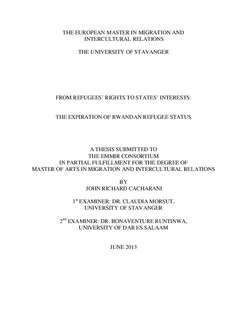| dc.description.abstract | Refugees bear incredible political significance for states of asylum and states of origin. Despite the shibboleth that hosting refugees is not an ‘unfriendly political act’, their very existence carries negative implications about state failure and state cooperation.
In the same way, protracted refugee caseloads operate as tangible evidence of sustained state negligence, violence, and responsibility. Refugees are political, social and economic burdens to hosting states and can undermine the legitimacy of those in power in the state of origin.
Refugee issues, as with other trans-sovereign issues, are managed through state cooperation and global governance mechanisms. The legal instruments and the bodies administering refugee protection are most heavily financed by and headquartered in developed/Northern/OECD states, while the absolute majority of refugees in states of asylum in the Global South. The end of the Cold War had significant impacts on global interests resulting in a greater deferment of responsibility upon states of first asylum in the Global South, not just in hosting refugees but in finding durable solutions as well. Here, the state of Uganda finds itself, as host to hundreds of thousands of refugees fleeing from conflict and the fear of persecution in East Africa.
This thesis contributes to the investigation of how lack of oversight and legitimate veto points in refugee decision-making, together with disproportioned responsibilities and regional factors affecting states of asylum in the Global South, has allowed for international refugee law to succumb to national interests and become increasingly instrumentalised by states to the detriment of refugee pop]ulations.
This thesis investigates why Rwandan refugees, who fled in the period 1959-1998 and reside in Uganda, will lose the recognition of their status on 30 June 2013. It presents a longitudinal view and understanding of where the decision to revoke refugee status from Rwandan refugees fits in the nexus of refugee protection and presents analysis and recommendation to amend and legitimise the application of durable solutions to protracted refugee caseloads. | no_NO |
